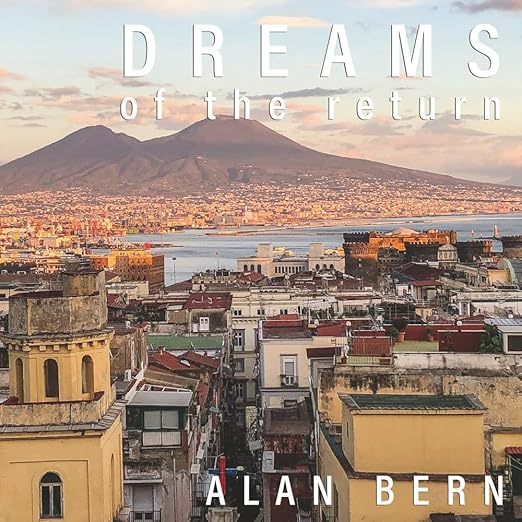Available Now!
Dreams of the return
In Dreams of the return, Bern remembers being a teenager in the mid-sixties, living in Napoli for just one year with his family, and falling in love with it as if it were his true second home.
Napoli was a city of extremes, beauty and chaos, the bests in terms of food (Christmas cookies –roccoco napoletani– and pizza pie!). The young people were the most beautiful he had ever encountered though, as they got older, they began to sag into an uncomfortable and often unpleasant aging. The traffic was monumental, and the pick-pockets were so numerous! Menacing Vulcano Vesuvius loomed over all with the beautiful blues of the Bay of Naples in the background as some relief.
Join Alan as he recounts his travels in Napoli and Southern Italy through poetry, prose, and photos.
Dreams of the Return is the unique work of a mature poet in love with the Italy where he spent part of his youth, in love with the Italian language, and taken by passage of time.
This book contains so much: Bern’s translations of great Italian poets, his own moving lyric poems, history, Eros, archaeology, photographs. How lucky for Bern to have had his Italy; how lucky for us that we have his memory of Italy in this lovely book.
“This trust/ attracted you/ to pain/ and the joy within it.”
—Steven Rood, author of Music Behind a Stone Wall
Alan Bern uncovers layers of history, memory, and love in his beautiful new book, Dreams of the return, an ode to his beloved Italia. Evocative photographs, interspersed throughout, create a three-dimensional surround for his poetry, translations, and prose. The images are intimate and personal, creating a visceral experience of Napoli’s timeless landscape, the haunting ruins of the Sassi, the ecstatic chapel paintings of Il Paradiso, to name just a few. Dreams of the return is an emotional tapestry: his translations of Dante and Leopardi are woven together with Bern’s memories, erotic glimpses into his time living in Napoli as a young man. I finished the book transported, wanting to return to Italy myself—to revisit the passion and complexity of a country that Bern captures with such tender devotion.
—Carol Jenkins, Painter, https://www.caroljenkinsart.com
For decades I’ve asked myself: why in the world, after just one year in an Italian high school, has Alan Bern wanted, again and again, through his whole life, to nourish his attachment to Napoli and to keep himself fully and kindly loyal to Italian? Now we are two old men. And I sometimes think that it is not Alan who has kept my Neapolitan places within him so richly, completely. Rather, it may be the other way around. It may be that this language full of music and Napoli old and powerful have decided to keep reaching out for Alan, month after month, year after year, all the way across the Mediterranean and through Gibraltar, the Atlantic Ocean, the Great Plains, the Rocky Mountains, the Sierras, to him in Berkeley.
—Marco Rossi-Doria, author of LA STRADA DELLE ANNURCHE, Poesie (1973-2020), and President of the Si Cambia Association
Alan Bern takes us to Italy’s mezzogiorno on a journey of joy, sorrow, melancholy, and just plain strangeness, as he guides us from Naples and the shadow of Vesuvius to Catania and the slopes of Mt. Etna. He uses photographs, prose, and poetry to conjure up his formative year as a young man in Naples, and his return as an adult, still in love with Italy, still trying to find his place in the past and the present. Alan translates the poet Giacomo Leopardi into English and then jumps into Leopardi’s skin to produce a poetic Leopardi-Bern metamorphosis. He slides between two worlds trying to triangulate where he is and what is happening, translating Italian into English, while his own poems are translated into Italian. His journey of remembrance and reckoning takes him back again and again to those age-old questions raised so long ago in Naples. Yes, there are side trips, north to Assisi and Orta, love poems along the way, but this book chronicles the return of Alan’s psyche to Italy’s south, magical, mysterious, magnificent.
—Stephen Tobriner
Professor Emeritus of Architectural History and Italian
University of California Berkeley
What does it mean to really experience the Socratic injunction to “know thyself”? Is the “I” simply a front man for a situation in which many, often conflicting “identities” exist in a state of fierce, constant manifestation? Alan Bern’s Dreams of the return is a fascinating and courageous exploration of these questions as the poet allows the various “fioretti,” “the little flowers” of our consciousness, to “stand in bright, white sunlight…all opened.” The book begins as far back as one can go, to the “ancient caves where humans resided for over 9,000 years.” Here, imagination is not the creation of fictions but the deep means of self-disclosure. Bern is a modern, Jewish man living in Berkeley, California, but the drive towards understanding brings him to ancient Italy, to Catholicism, to the poetry of Dante, to the very language Dante spoke. Here, translation is not so much revelation of the other as it is revelation of the self in another guise. The excitement of this book is the author’s always open invitation to the reader to join the poet in this deeply human quest. We are reading Bern, but, secretly, we are reading ourselves as well.
—Jack Foley, poet and critic and author, most recently, of COLLISIONS
A haunting bilingual assemblage of Italian glimpses in the mind of an American, from great poets (Dante, Leopardi, Pavese) to the surprise of eating Arab-based food in Sicily when snowed in — a page turner, read with the pleasure of having no idea what will come next.
—Peter Dale Scott, author most recently, of Dreamcraft (poetry) and
Reading the Dream: A Post-Secular History of Enmindment (a poem in prose)

